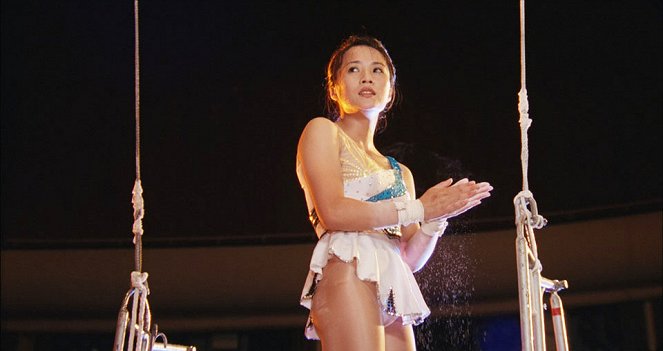Juonikuvaukset(1)
Pohjoiskorealaisen hiilikaivoksen hurmaava neiti Kim haaveilee trapetsitaiturin urasta, mutta sitä ennen hänen pitää kasvaa työläisenä, osallistua yhteiskunnan rakentamiseen ja voittaa korkean paikan kammo. Onneksi maan rakastettu johtaja tarjoaa parhaat mahdolliset puitteet. Suurin osa pohjoiskorealaisista elokuvista on silkkaa propagandaa, mutta kansainvälisenä yhteistyöhankkeena – ensimmäisen kerran sitten Berliinin muurin murtumisen – toteutettu Comrade Kim Goes Flying on poikkeuksellinen tuotanto. Yksilö, jolla on oma tahto ja joka ponnistelee päättäväisesti oman unelmansa toteuttamiseksi, on Pohjois-Koreassa lähes käsittämätön ajatus. Yleensä elokuvien naispäähenkilöiden on sallittu rakastaa ainoastaan ikuista presidenttiä Kim Il-sungia ja hänen poikaansa, rakastettua johtajaa Kim Jong-iliä. Se, että romanttisen agitaatio-hömppäkomedian päähenkilö uhraa helliä ajatuksia vastakkaiselle sukupuolelle on poikkeuksellista. Comrade Kim Goes Flying on työläisten paratiisiin sijoittuva eskapistinen ja herttainen satu. Työväenluokan keskinäinen solidaarisuus on koskettavaa, vallankumouslaulut hengästyttävän reippaita, ja maailman paras valtio loistaa kirkkaissa technicolour-väreissä.
Jouni Hokkanen
(Helsinki International Film Festival)
Videot (1)
Arvostelut (1)
Before the screening, Western producers, irritated by the word propaganda in the Febia program, needed to consistently ideologically orient us in their work. What we learned was: Comrade Kim Goes Flying is an apolitical work, universally human, aimed at the North Korean audience and groundbreaking in several respects, when, for the first time in the history of local cinema, it places the protagonist at the forefront, allegedly emancipated and making decisions of her own free will. Of course, we can perceive Comrade Kim's suffering as a cute, clumsily-told and "deeply human story", but that requires a degree of ignorance from us. First of all - there can be no question of any emancipated and independent protagonist. Comrade Kim's decision-making and her "always higher" rise is always motivated by a collective framework that serves as a corrective and encouragement where the individual fails. Comrade Kim Goes Flying it is not a story of the triumph of the individual, but of the strength and determination of the working class, which I did not invent, because the characters in the film repeatedly emphasize it. The subject always acts here in a firmly hierarchically defined framework of power, at the top of which stands the Leader, who has decided that the world will be as it is (which one of the characters again tells us when Comrade Kim doubts the most). Alleged universal humanity is exactly what every ideology plays at, and it doesn't matter if the Leader-Sun rises above it, or a marketing phrase about the fulfillment of dreams, which could, as far as I know, be the slogan of a bank. In this regard, the "anti-propaganda" statement of the creators can be taken as the statement of a masturbator who, being caught with his cock in his hand, claims that he is not masturbating, but rather that he is caressing his limb. What Comrade Kim Goes Flying tells us about North Korean cinema: human automatons are acting here who demonstrate emotions (especially joy) in a way that ensures there is no doubt about what is going on. The camera anchors these emotions in a clear environment (when the comrades talk about love, boats decorated with flowers full of dating couples sail in the background). The humor is limited to harmless family squabbles and grumbling grandfathers. The scenes of "building" and collective fun are partly taken from documentary films, which can be seen in the quality of the visual. The situation where the characters of the workers "build" a new house, which consists of plastering a monstrous panel ruin, remembering the young years of Kim Jong-il, is the best ideological "slip of tongue" of the entire film. If we summarize the ideological ground plan, the narrative pattern and motivational structure, Comrade Kim Goes Flying is essentially a model product of Stalinist lack of conflict, and rather than "Juche Flashdance," it evokes Sequens' Way Leading to Happiness. The question of what the audience does with a film like this is up in the air. A) they are outraged by the propagandistic stupidity of the criminal system, B) they laugh at that naivety and quietly rejoice that they have the upper hand over the "heroes", C) they are annoyed to death, because the film offers nothing revealing at all and very little stimulus, even for propaganda lovers. In any case, it is not entirely clear to me what this "cultural exchange" between East and West was supposed to achieve. The producers most of all resemble tourists who travel to North Korea with a tour group, go through the "Indian reservation of totalitarianism" and end up at a dance of rosy children, because, of course, "it's beautiful when children rejoice". But it is not that simple. Not even Comrade Kim's square somersault. P.S. In connection with Žižek's metaphor of insight from ideology as glasses that we are afraid to wear, the question arises whether similar films are not popular with Western audiences mainly because they confirm that he does not need any glasses, because "he clearly sees the delusion".
()
(vähemmän)
(lisää)
Kuvagalleria (2)
Kuva © Koryo Group


